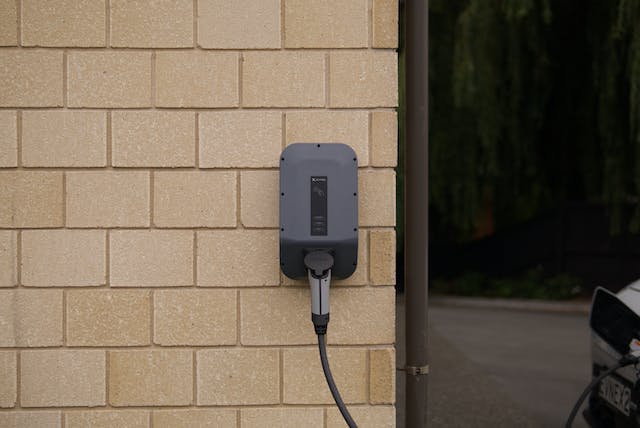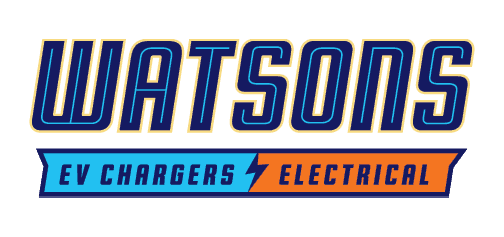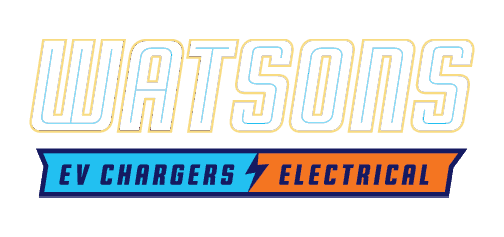Do you need a permit to install an EV charger?

Electric vehicles (EVs) are rapidly becoming a staple on our roads, reflecting a significant shift towards sustainable transportation. This surge in popularity is paralleled by an increasing demand for home EV charging stations. Amidst this growing trend, a vital question emerges for homeowners and EV drivers: Do you need a permit to install an EV charger? This blog takes a look at everything you need to know, such as the regulations and requirements surrounding EV charger installation.
Understanding EV Chargers
Different Types of EV Chargers
When considering an EV charger for your home, it’s essential to understand the various types available, each with unique features and suitability for different lifestyles, so you need to choose the right EV charger for your circumstances.
Level 1 Chargers
These chargers are the most accessible, as they plug into any standard 120-volt household outlet. Ideal for overnight charging, they typically deliver about 4 to 5 miles of range per hour of charging. Level 1 chargers are a perfect starting point for new EV owners or those who drive shorter distances daily.
Level 2 Chargers
A step up, Level 2 chargers require a 240-volt outlet (similar to what your dryer uses) and can provide about 12 to 80 miles of range per hour of charging. They are a popular choice for residential use due to their balance of speed and convenience. Homeowners might consider installing a Level 2 charger if they find themselves needing quicker charging times or have a longer daily commute.
DC Fast Chargers
These are the heavy hitters in the EV charging world, often found in public charging stations. They can add 60 to 100 miles of range in just 20 minutes of charging, making them ideal for long-distance travel. However, due to their high power requirements, they're not typically installed in residential settings.
Installation Essentials
The installation of an EV charger is not just about plugging in a device. It requires thoughtful consideration of several factors:
Electrical System Compatibility
Before installing a Level 2 charger, ensure your home’s electrical system can handle the additional load. This might involve an inspection and possible upgrade by a certified electrician.
Location and Space
Where to place your charger? Ideally, it should be near where you park your EV and easily accessible. Also, consider the length of the charger cable and the distance to your vehicle.
Weather Protection and Safety
If installing outside, ensure the charger is weatherproof and safe from environmental elements. Indoor installations, like in a garage, often provide natural protection but still require proper ventilation and safety considerations.
Permits and Regulations
Depending on your location, you may need a permit to install an EV charger, especially for Level 2 and above. It's crucial to check with local authorities and adhere to building codes and safety standards.
By understanding these essentials, you can make an informed decision about which charger type suits your needs and how to prepare for a safe and efficient installation.
Do You Need a Permit to Install an EV Charger?
Yes, in many cases, you do need a permit to install an EV charger. The necessity for a permit largely hinges on the type of charger you are installing, the complexity of the installation, and local building regulations. Honestly, the straightforward answer is: it depends.
Situations Requiring a Permit
Installing a Level 2 Charger: Due to their higher voltage requirements and the need for a dedicated circuit, Level 2 chargers usually require a permit. This is because their installation involves significant electrical work, which needs to comply with safety standards.
Any Electrical Upgrades: If the installation of your EV charger requires modifications to your home's electrical system, like upgrading your electrical panel or wiring, you will likely need a permit. This ensures that all changes meet local electrical codes.
Outdoor Installations: If you plan to install the charger outside your home, particularly in a standalone structure, permits are often required to ensure the installation is weatherproof and safe.
Situations Where a Permit May Not Be Required
Using a Level 1 Charger: Level 1 chargers, which plug into standard 120-volt outlets, typically don't require a permit since they don’t involve any complex installation or significant electrical changes.
No Structural Changes Needed: If the installation of your EV charger doesn't require any major electrical upgrades or structural changes to your property, you might not need a permit.
Inside Garage Installations: Installing a charger inside your garage, especially if it's just a simple plug-in with no major electrical work, might not necessitate a permit.
Permit Requirements and Regulations
The necessity for a permit primarily hinges on your location, the type of charger you're installing, and the complexity of the installation. Let's break these down:
Location-Based Requirements
Permit requirements can vary greatly depending on your local government’s regulations. Some cities and municipalities mandate permits for all types of EV charger installations, while others may have more relaxed rules.
Charger Type Matters
Typically, Level 1 chargers, which plug into standard household outlets, might not require a permit. However, Level 2 chargers, due to their higher voltage and more complex installation, often do.
Complexity of Installation
If the installation process involves extensive electrical work or modifications to your home's existing wiring, a permit is more likely to be necessary. This is to ensure that all modifications meet safety standards and building codes.
Understanding these factors is crucial in determining whether you need to obtain a permit. It’s always advisable to check with your local building department to get accurate information pertinent to your specific situation.
Navigating Local Building Codes
Compliance with local building and electrical codes is not only a legal requirement but a matter of safety. Here's how you can navigate these:
1. Contact Local Authorities: Your first step should be to reach out to your local building department or government office. They can provide detailed information about the requirements in your area.
2. Understanding the Codes: Local building and electrical codes can be complex. These codes ensure that installations are carried out safely and are up to the standards that protect your home and community.
3. Importance of Compliance: Adhering to these regulations is critical. Non-compliance can lead to safety hazards, fines, and complications in future property transactions. Furthermore, it ensures that your charger installation is safe and reliable.
In summary, while the need for a permit to install an EV charger can vary, it's a crucial step in many cases. Understanding and adhering to local regulations and building codes ensures legal compliance and guarantees the safety and efficacy of your installation. This knowledge is key to a successful and secure EV charger setup in your home.
Risks of Unpermitted Installations
Consequences of Skipping the Permit
Opting to install an EV charger without the necessary permits can lead to several significant risks. Understanding these risks is crucial for homeowners considering this route.
Safety Hazards: Unpermitted installations may not adhere to safety standards, increasing the risk of electrical fires or malfunctions. This is especially concerning with high-voltage installations like Level 2 chargers.
Insurance Issues: Many insurance policies require compliance with local building codes. Unpermitted installations can void your home insurance policy, leaving you financially vulnerable in case of accidents or damages related to the charger.
Impact on Property Value: Unpermitted work can negatively affect your home’s resale value. Prospective buyers or real estate agents might view it as a liability, potentially leading to lower offers or difficulties in selling the property.
Future Inspections and Legal Complications: If unpermitted work is discovered during future inspections or renovations, you might face legal penalties, fines, or be required to dismantle the installation. This can lead to additional costs and legal troubles.
Safe Installation Practices
For homeowners in areas where a permit is not required, or for those installing a Level 1 charger which typically doesn't need a permit, following safe installation practices is essential.
Adhere to Manufacturer's Instructions: Always follow the guidelines provided by the charger manufacturer. These instructions are designed to ensure safe and efficient operation of the device.
Consult Professionals: Even if a permit isn’t required, consulting with a licensed electrician can provide peace of mind. They can ensure that the installation is safe and doesn't overload your home's electrical system.
Regular Maintenance: Regular checks and maintenance of your EV charger can prevent potential hazards. This includes inspecting for wear and tear, ensuring all connections are secure, and monitoring for any unusual behavior.
Conclusion
The installation of an EV charger is an exciting step towards embracing cleaner, more sustainable transportation. However, understanding and adhering to permit requirements is not only a legal obligation but a critical aspect of ensuring safety and protecting your investment.
While permits may seem like an additional step, they are there to ensure that installations meet safety standards, thereby protecting homeowners and their properties. Balancing legal compliance with the convenience and environmental benefits of home EV charging is key.
We encourage all EV owners and prospective buyers to stay informed about their local regulations, consult professionals when in doubt, and always prioritize safety in their journey towards a greener future. Watson’s Charging Stations is here to assist you in navigating these requirements and making the transition to electric vehicles smooth and secure.

